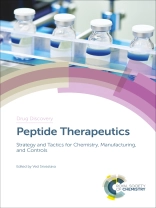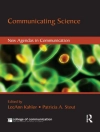Peptide therapy has become a key strategy in innovative drug development, however, one of the potential barriers for the development of novel peptide drugs in the clinic is their deficiencies in clearly defined chemistry, manufacturing and controls (CMC) strategy from clinical development to commercialization. CMC can often become a rate-limiting step due to lack of knowledge and lack of a formal policy or guidelines on CMC for peptide-based drugs. Regulators use a risk-based approach, reviewing applications on a case-by-case basis.
Peptide Therapeutics: Strategy and Tactics for Chemistry, Manufacturing, and Controls covers efficient manufacturing of peptide drug substances, a review of the process for submitting applications to the regulatory authority for drug approval, a holistic approach for quality attributes and quality control from a regulatory perspective, emerging analytical tools for the characterisation of impurities, and the assessment of stability.
This book is an essential reference work for students and researchers, in both academia and industry, with an interest in learning about CMC, and facilitating development and manufacture of peptide-based drugs.
Spis treści
Regulatory Considerations for Peptide Therapeutics; Regulatory Perspective on Synthetic Peptides in Europe; Biological and Immunogenicity Evaluation Strategy for Therapeutic Peptides: Chemistry, Manufacturing and Controls Perspective; Chemistry, Manufacturing and Controls: Active Pharmaceutical Ingredient and Drug Product; Peptide Manufacturing Methods and Challenges; Economic and Environmental Factors Affecting the Sustainability of Peptide Therapeutic Manufacturing; A Holistic Quality Control Strategy for Peptide Active Pharmaceutical Ingredients (APIs); Higher-order Structure Characterization and Comparability Assessments for Peptides; Impurity Characterization and Quantification by Liquid Chromatography-High-resolution Mass Spectrometry; Mass Spectrometric Analysis for the Quality Control of Peptide Conjugate Therapeutics; Determination of the Identity, Content and Purity of Therapeutic Peptides by NMR Spectroscopy; Transport, Stability and Delivery Considerations for the Design of Peptide Drugs; Assessing the Impact of Functional Excipients on Peptide Drug Product Attributes During Pharmaceutical Development; Formulations of Microspheres and Nanoparticles for Peptide Delivery












